UK College: Legislation and Ethics in Travel and Tourism Report
VerifiedAdded on 2020/10/23
|20
|5228
|183
Report
AI Summary
This report comprehensively analyzes the legal and ethical dimensions of the travel and tourism industry, using Thomas Cook as a case study. It begins by outlining the legal and regulatory frameworks, including relevant acts and regulatory bodies such as the Licensing Act, Transport Act, Strategic Rail Authority, Health and Safety Commission, and Civil Aviation Authority. It then delves into surface, sea, and air transport laws, detailing regulations like the Carriage of Passenger by Road Act, Warsaw Convention, Tokyo Convention, Hague Treaty, Montreal Convention, and Regulation (EU) No. 1177/2010. The report explores the impacts of health, safety, and security legislation, such as the Health and Safety at Work Act and Occupiers Liability Act, as well as the analysis of legislation related to equality, including the Sex Discrimination Act, Race Discrimination Act, Employment Protection Act, Disability Discrimination Act, Employment Act, and Human Rights Act. Furthermore, it examines contract and consumer protection legislation, and concludes with a discussion of ethical dilemmas in the travel and tourism industry and the CSR policy of Thomas Cook. The report emphasizes the importance of adhering to legal norms and ethical practices to provide satisfactory services to consumers and ensure the sustainability of travel and tourism businesses.
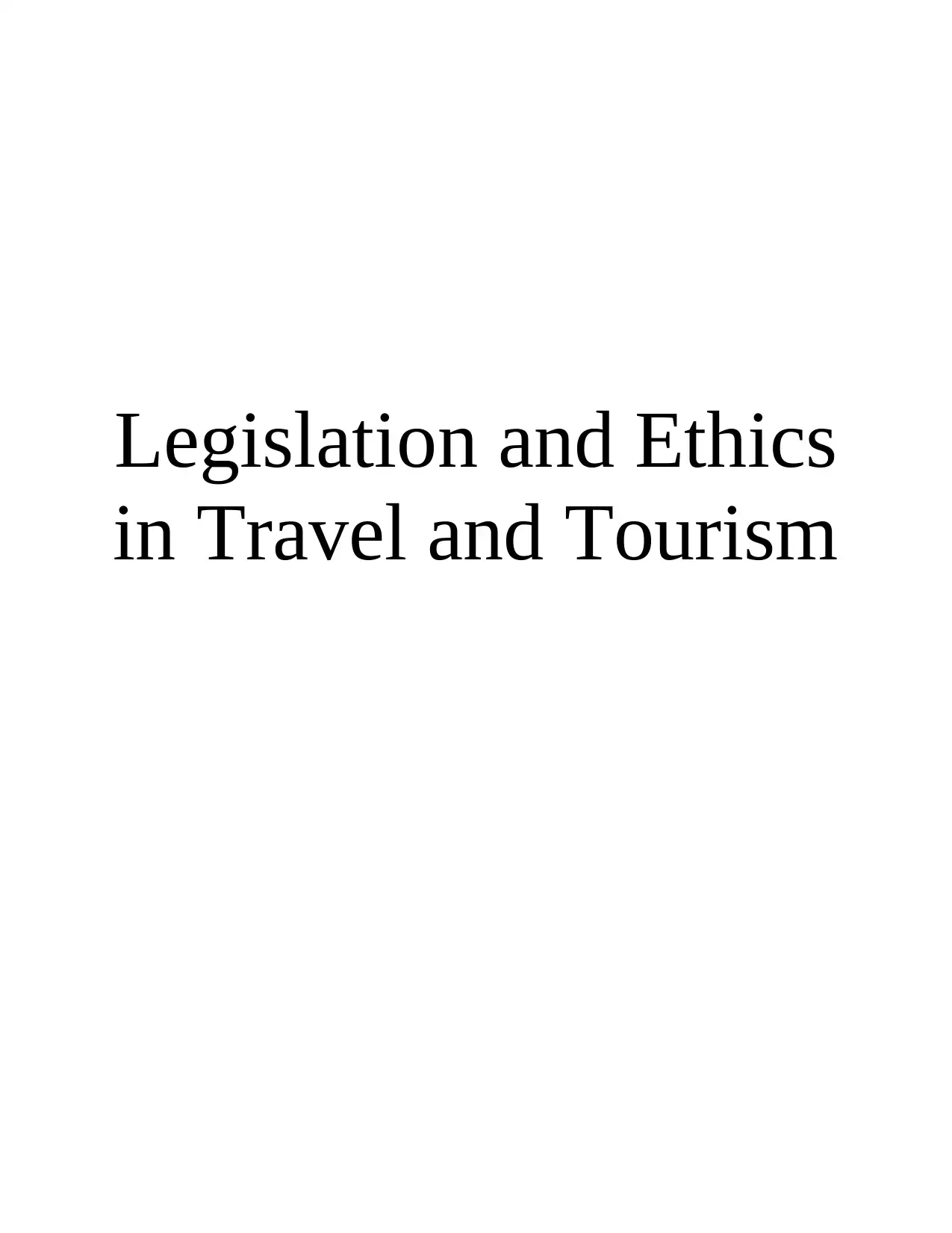
Legislation and Ethics
in Travel and Tourism
in Travel and Tourism
Paraphrase This Document
Need a fresh take? Get an instant paraphrase of this document with our AI Paraphraser
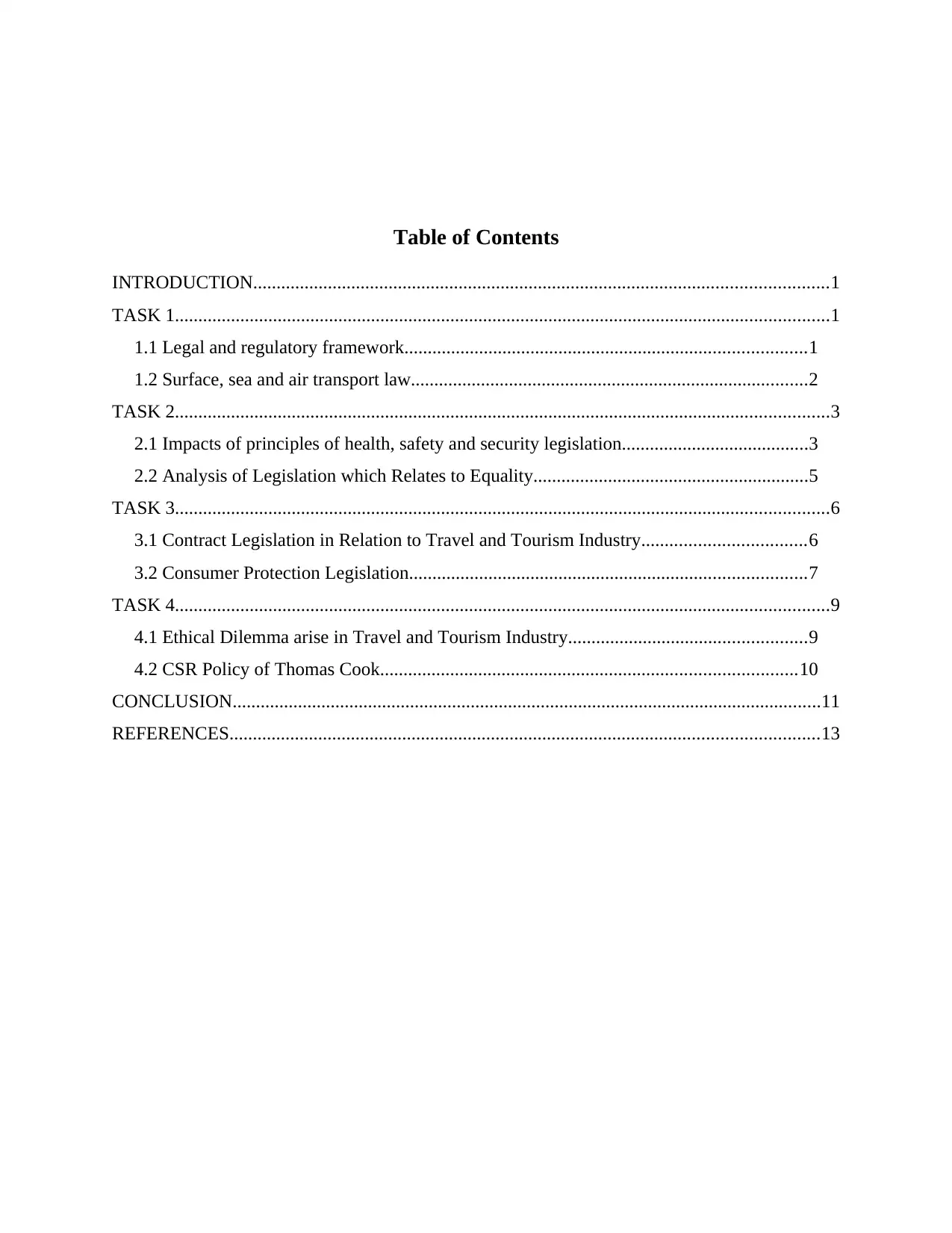
Table of Contents
INTRODUCTION...........................................................................................................................1
TASK 1............................................................................................................................................1
1.1 Legal and regulatory framework......................................................................................1
1.2 Surface, sea and air transport law.....................................................................................2
TASK 2............................................................................................................................................3
2.1 Impacts of principles of health, safety and security legislation........................................3
2.2 Analysis of Legislation which Relates to Equality...........................................................5
TASK 3............................................................................................................................................6
3.1 Contract Legislation in Relation to Travel and Tourism Industry...................................6
3.2 Consumer Protection Legislation.....................................................................................7
TASK 4............................................................................................................................................9
4.1 Ethical Dilemma arise in Travel and Tourism Industry...................................................9
4.2 CSR Policy of Thomas Cook.........................................................................................10
CONCLUSION..............................................................................................................................11
REFERENCES..............................................................................................................................13
INTRODUCTION...........................................................................................................................1
TASK 1............................................................................................................................................1
1.1 Legal and regulatory framework......................................................................................1
1.2 Surface, sea and air transport law.....................................................................................2
TASK 2............................................................................................................................................3
2.1 Impacts of principles of health, safety and security legislation........................................3
2.2 Analysis of Legislation which Relates to Equality...........................................................5
TASK 3............................................................................................................................................6
3.1 Contract Legislation in Relation to Travel and Tourism Industry...................................6
3.2 Consumer Protection Legislation.....................................................................................7
TASK 4............................................................................................................................................9
4.1 Ethical Dilemma arise in Travel and Tourism Industry...................................................9
4.2 CSR Policy of Thomas Cook.........................................................................................10
CONCLUSION..............................................................................................................................11
REFERENCES..............................................................................................................................13
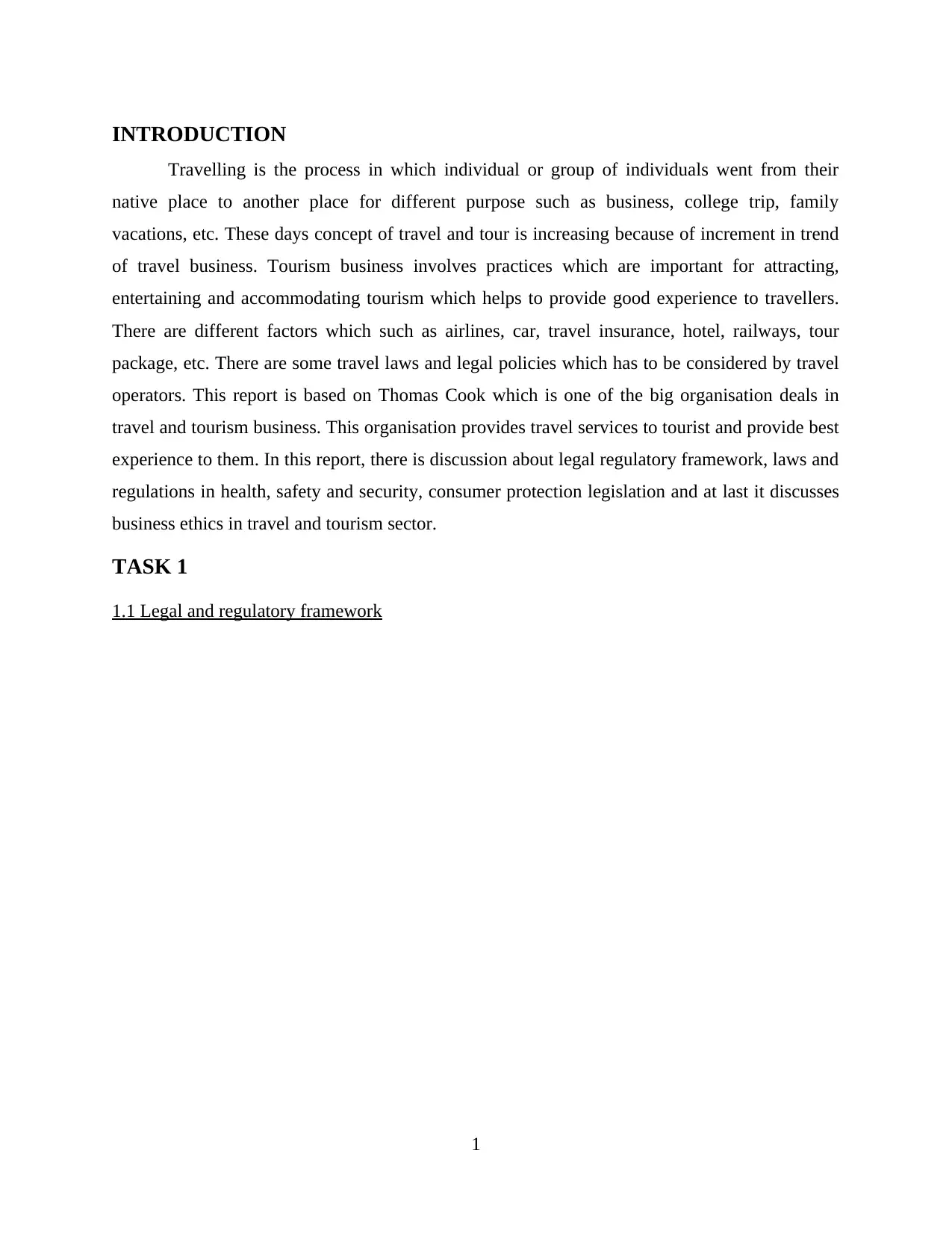
INTRODUCTION
Travelling is the process in which individual or group of individuals went from their
native place to another place for different purpose such as business, college trip, family
vacations, etc. These days concept of travel and tour is increasing because of increment in trend
of travel business. Tourism business involves practices which are important for attracting,
entertaining and accommodating tourism which helps to provide good experience to travellers.
There are different factors which such as airlines, car, travel insurance, hotel, railways, tour
package, etc. There are some travel laws and legal policies which has to be considered by travel
operators. This report is based on Thomas Cook which is one of the big organisation deals in
travel and tourism business. This organisation provides travel services to tourist and provide best
experience to them. In this report, there is discussion about legal regulatory framework, laws and
regulations in health, safety and security, consumer protection legislation and at last it discusses
business ethics in travel and tourism sector.
TASK 1
1.1 Legal and regulatory framework
1
Travelling is the process in which individual or group of individuals went from their
native place to another place for different purpose such as business, college trip, family
vacations, etc. These days concept of travel and tour is increasing because of increment in trend
of travel business. Tourism business involves practices which are important for attracting,
entertaining and accommodating tourism which helps to provide good experience to travellers.
There are different factors which such as airlines, car, travel insurance, hotel, railways, tour
package, etc. There are some travel laws and legal policies which has to be considered by travel
operators. This report is based on Thomas Cook which is one of the big organisation deals in
travel and tourism business. This organisation provides travel services to tourist and provide best
experience to them. In this report, there is discussion about legal regulatory framework, laws and
regulations in health, safety and security, consumer protection legislation and at last it discusses
business ethics in travel and tourism sector.
TASK 1
1.1 Legal and regulatory framework
1
⊘ This is a preview!⊘
Do you want full access?
Subscribe today to unlock all pages.

Trusted by 1+ million students worldwide
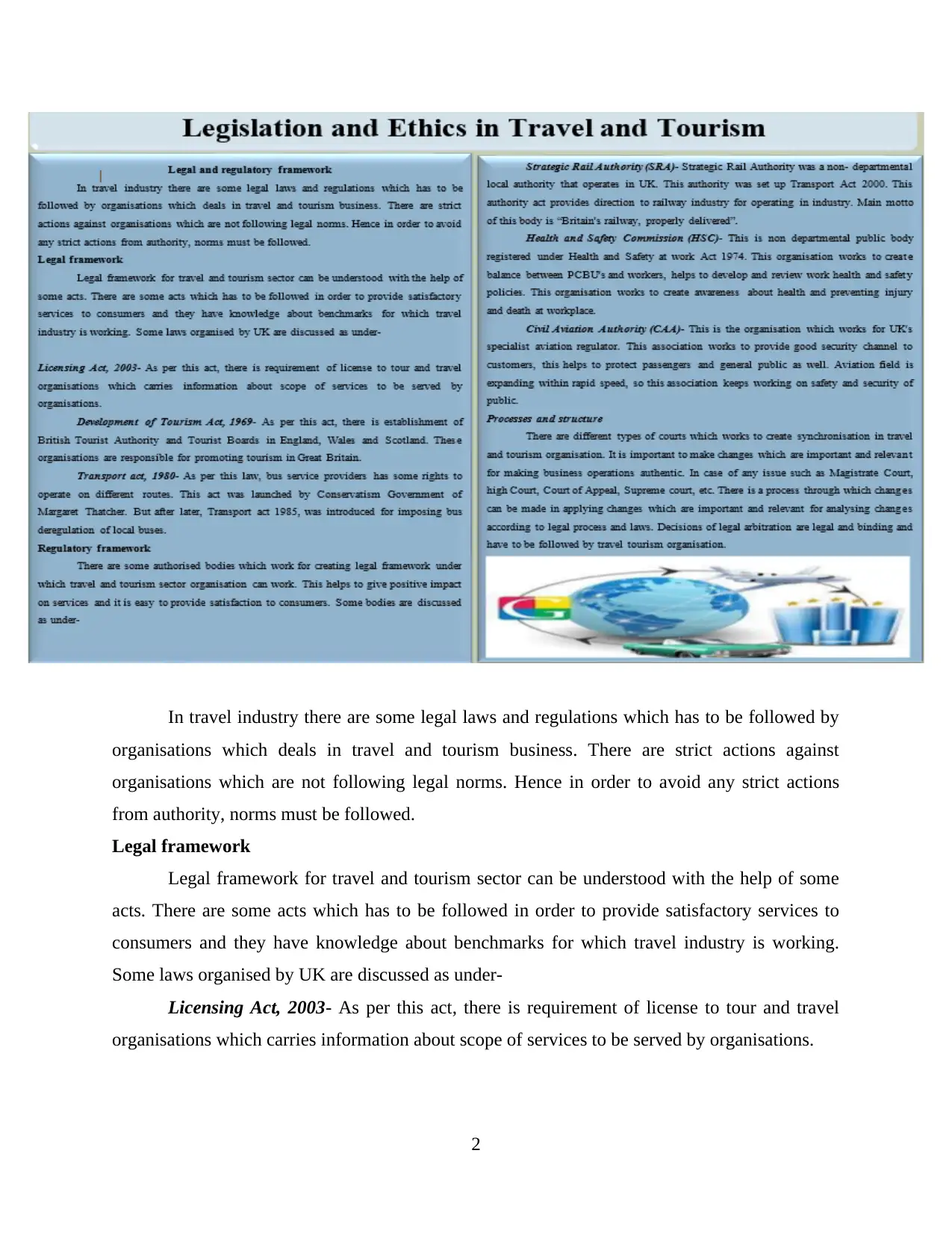
In travel industry there are some legal laws and regulations which has to be followed by
organisations which deals in travel and tourism business. There are strict actions against
organisations which are not following legal norms. Hence in order to avoid any strict actions
from authority, norms must be followed.
Legal framework
Legal framework for travel and tourism sector can be understood with the help of some
acts. There are some acts which has to be followed in order to provide satisfactory services to
consumers and they have knowledge about benchmarks for which travel industry is working.
Some laws organised by UK are discussed as under-
Licensing Act, 2003- As per this act, there is requirement of license to tour and travel
organisations which carries information about scope of services to be served by organisations.
2
organisations which deals in travel and tourism business. There are strict actions against
organisations which are not following legal norms. Hence in order to avoid any strict actions
from authority, norms must be followed.
Legal framework
Legal framework for travel and tourism sector can be understood with the help of some
acts. There are some acts which has to be followed in order to provide satisfactory services to
consumers and they have knowledge about benchmarks for which travel industry is working.
Some laws organised by UK are discussed as under-
Licensing Act, 2003- As per this act, there is requirement of license to tour and travel
organisations which carries information about scope of services to be served by organisations.
2
Paraphrase This Document
Need a fresh take? Get an instant paraphrase of this document with our AI Paraphraser
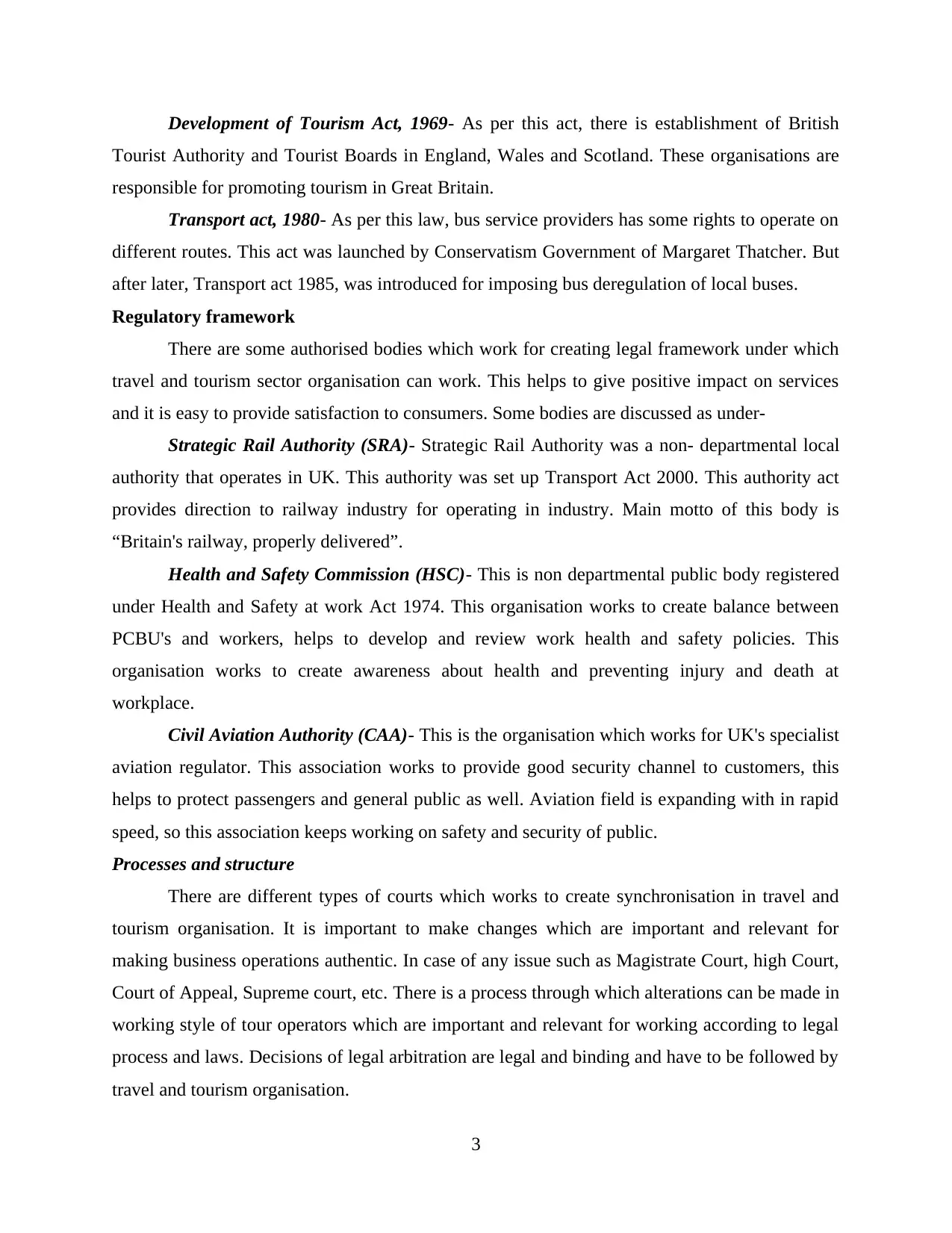
Development of Tourism Act, 1969- As per this act, there is establishment of British
Tourist Authority and Tourist Boards in England, Wales and Scotland. These organisations are
responsible for promoting tourism in Great Britain.
Transport act, 1980- As per this law, bus service providers has some rights to operate on
different routes. This act was launched by Conservatism Government of Margaret Thatcher. But
after later, Transport act 1985, was introduced for imposing bus deregulation of local buses.
Regulatory framework
There are some authorised bodies which work for creating legal framework under which
travel and tourism sector organisation can work. This helps to give positive impact on services
and it is easy to provide satisfaction to consumers. Some bodies are discussed as under-
Strategic Rail Authority (SRA)- Strategic Rail Authority was a non- departmental local
authority that operates in UK. This authority was set up Transport Act 2000. This authority act
provides direction to railway industry for operating in industry. Main motto of this body is
“Britain's railway, properly delivered”.
Health and Safety Commission (HSC)- This is non departmental public body registered
under Health and Safety at work Act 1974. This organisation works to create balance between
PCBU's and workers, helps to develop and review work health and safety policies. This
organisation works to create awareness about health and preventing injury and death at
workplace.
Civil Aviation Authority (CAA)- This is the organisation which works for UK's specialist
aviation regulator. This association works to provide good security channel to customers, this
helps to protect passengers and general public as well. Aviation field is expanding with in rapid
speed, so this association keeps working on safety and security of public.
Processes and structure
There are different types of courts which works to create synchronisation in travel and
tourism organisation. It is important to make changes which are important and relevant for
making business operations authentic. In case of any issue such as Magistrate Court, high Court,
Court of Appeal, Supreme court, etc. There is a process through which alterations can be made in
working style of tour operators which are important and relevant for working according to legal
process and laws. Decisions of legal arbitration are legal and binding and have to be followed by
travel and tourism organisation.
3
Tourist Authority and Tourist Boards in England, Wales and Scotland. These organisations are
responsible for promoting tourism in Great Britain.
Transport act, 1980- As per this law, bus service providers has some rights to operate on
different routes. This act was launched by Conservatism Government of Margaret Thatcher. But
after later, Transport act 1985, was introduced for imposing bus deregulation of local buses.
Regulatory framework
There are some authorised bodies which work for creating legal framework under which
travel and tourism sector organisation can work. This helps to give positive impact on services
and it is easy to provide satisfaction to consumers. Some bodies are discussed as under-
Strategic Rail Authority (SRA)- Strategic Rail Authority was a non- departmental local
authority that operates in UK. This authority was set up Transport Act 2000. This authority act
provides direction to railway industry for operating in industry. Main motto of this body is
“Britain's railway, properly delivered”.
Health and Safety Commission (HSC)- This is non departmental public body registered
under Health and Safety at work Act 1974. This organisation works to create balance between
PCBU's and workers, helps to develop and review work health and safety policies. This
organisation works to create awareness about health and preventing injury and death at
workplace.
Civil Aviation Authority (CAA)- This is the organisation which works for UK's specialist
aviation regulator. This association works to provide good security channel to customers, this
helps to protect passengers and general public as well. Aviation field is expanding with in rapid
speed, so this association keeps working on safety and security of public.
Processes and structure
There are different types of courts which works to create synchronisation in travel and
tourism organisation. It is important to make changes which are important and relevant for
making business operations authentic. In case of any issue such as Magistrate Court, high Court,
Court of Appeal, Supreme court, etc. There is a process through which alterations can be made in
working style of tour operators which are important and relevant for working according to legal
process and laws. Decisions of legal arbitration are legal and binding and have to be followed by
travel and tourism organisation.
3
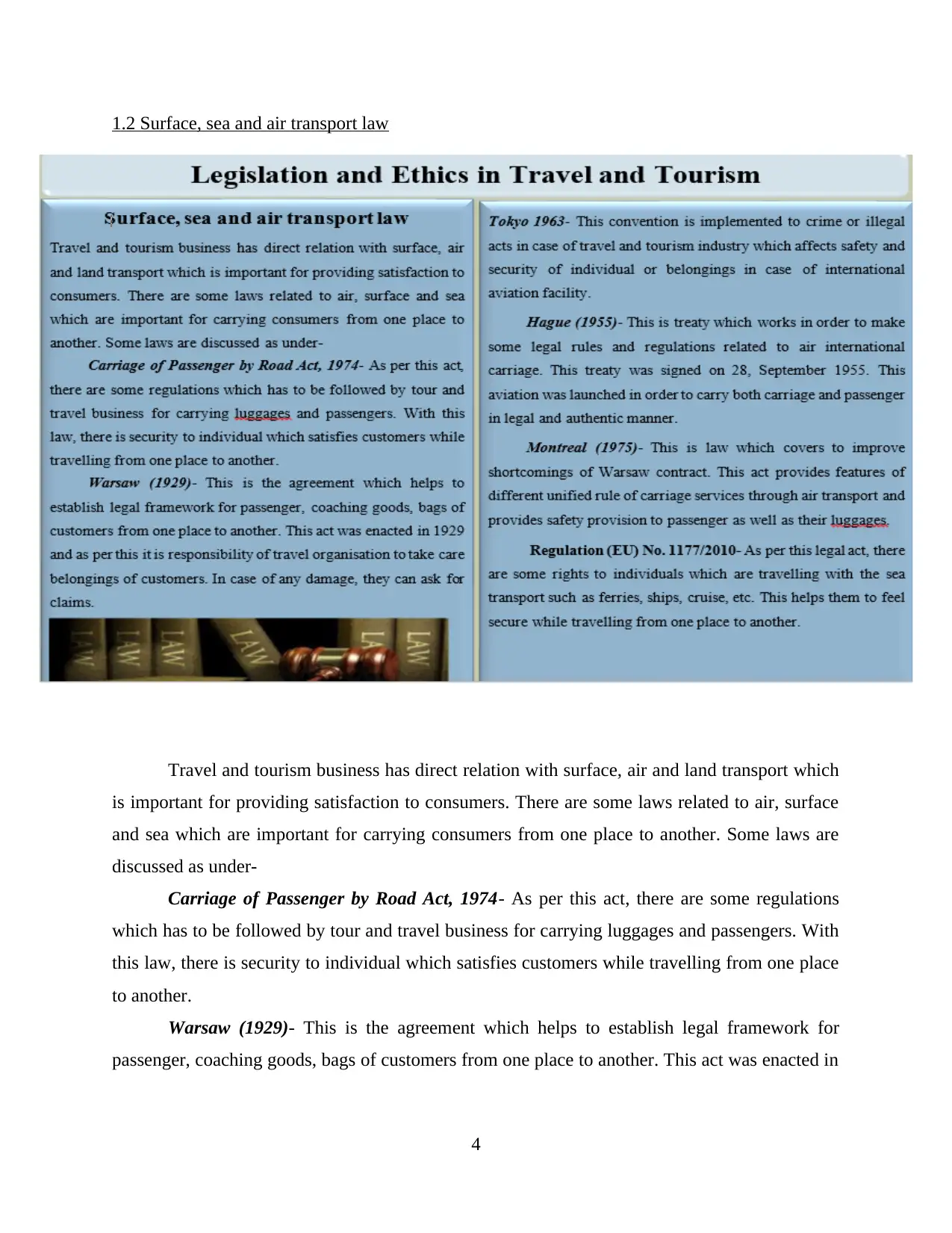
1.2 Surface, sea and air transport law
Travel and tourism business has direct relation with surface, air and land transport which
is important for providing satisfaction to consumers. There are some laws related to air, surface
and sea which are important for carrying consumers from one place to another. Some laws are
discussed as under-
Carriage of Passenger by Road Act, 1974- As per this act, there are some regulations
which has to be followed by tour and travel business for carrying luggages and passengers. With
this law, there is security to individual which satisfies customers while travelling from one place
to another.
Warsaw (1929)- This is the agreement which helps to establish legal framework for
passenger, coaching goods, bags of customers from one place to another. This act was enacted in
4
Travel and tourism business has direct relation with surface, air and land transport which
is important for providing satisfaction to consumers. There are some laws related to air, surface
and sea which are important for carrying consumers from one place to another. Some laws are
discussed as under-
Carriage of Passenger by Road Act, 1974- As per this act, there are some regulations
which has to be followed by tour and travel business for carrying luggages and passengers. With
this law, there is security to individual which satisfies customers while travelling from one place
to another.
Warsaw (1929)- This is the agreement which helps to establish legal framework for
passenger, coaching goods, bags of customers from one place to another. This act was enacted in
4
⊘ This is a preview!⊘
Do you want full access?
Subscribe today to unlock all pages.

Trusted by 1+ million students worldwide
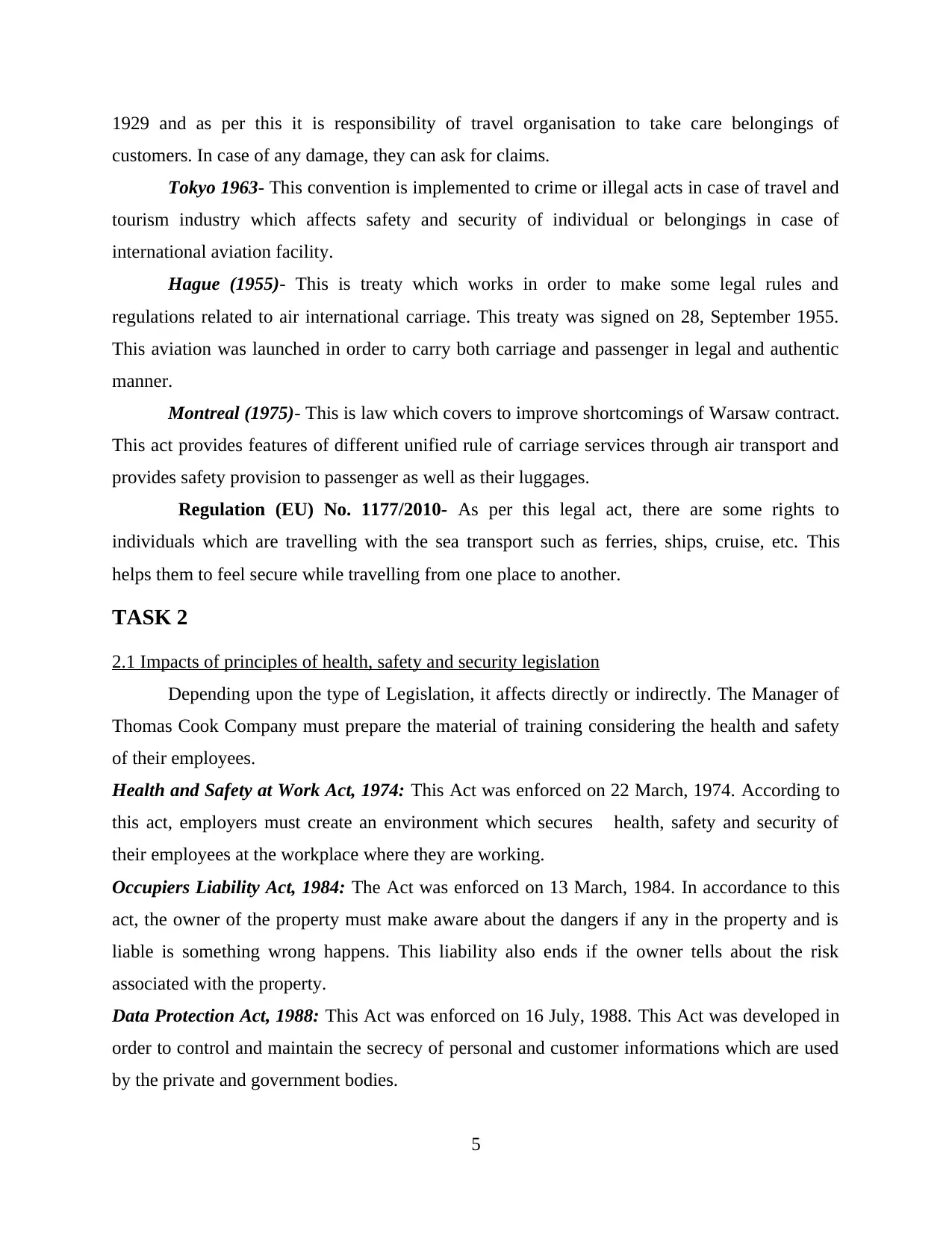
1929 and as per this it is responsibility of travel organisation to take care belongings of
customers. In case of any damage, they can ask for claims.
Tokyo 1963- This convention is implemented to crime or illegal acts in case of travel and
tourism industry which affects safety and security of individual or belongings in case of
international aviation facility.
Hague (1955)- This is treaty which works in order to make some legal rules and
regulations related to air international carriage. This treaty was signed on 28, September 1955.
This aviation was launched in order to carry both carriage and passenger in legal and authentic
manner.
Montreal (1975)- This is law which covers to improve shortcomings of Warsaw contract.
This act provides features of different unified rule of carriage services through air transport and
provides safety provision to passenger as well as their luggages.
Regulation (EU) No. 1177/2010- As per this legal act, there are some rights to
individuals which are travelling with the sea transport such as ferries, ships, cruise, etc. This
helps them to feel secure while travelling from one place to another.
TASK 2
2.1 Impacts of principles of health, safety and security legislation
Depending upon the type of Legislation, it affects directly or indirectly. The Manager of
Thomas Cook Company must prepare the material of training considering the health and safety
of their employees.
Health and Safety at Work Act, 1974: This Act was enforced on 22 March, 1974. According to
this act, employers must create an environment which secures health, safety and security of
their employees at the workplace where they are working.
Occupiers Liability Act, 1984: The Act was enforced on 13 March, 1984. In accordance to this
act, the owner of the property must make aware about the dangers if any in the property and is
liable is something wrong happens. This liability also ends if the owner tells about the risk
associated with the property.
Data Protection Act, 1988: This Act was enforced on 16 July, 1988. This Act was developed in
order to control and maintain the secrecy of personal and customer informations which are used
by the private and government bodies.
5
customers. In case of any damage, they can ask for claims.
Tokyo 1963- This convention is implemented to crime or illegal acts in case of travel and
tourism industry which affects safety and security of individual or belongings in case of
international aviation facility.
Hague (1955)- This is treaty which works in order to make some legal rules and
regulations related to air international carriage. This treaty was signed on 28, September 1955.
This aviation was launched in order to carry both carriage and passenger in legal and authentic
manner.
Montreal (1975)- This is law which covers to improve shortcomings of Warsaw contract.
This act provides features of different unified rule of carriage services through air transport and
provides safety provision to passenger as well as their luggages.
Regulation (EU) No. 1177/2010- As per this legal act, there are some rights to
individuals which are travelling with the sea transport such as ferries, ships, cruise, etc. This
helps them to feel secure while travelling from one place to another.
TASK 2
2.1 Impacts of principles of health, safety and security legislation
Depending upon the type of Legislation, it affects directly or indirectly. The Manager of
Thomas Cook Company must prepare the material of training considering the health and safety
of their employees.
Health and Safety at Work Act, 1974: This Act was enforced on 22 March, 1974. According to
this act, employers must create an environment which secures health, safety and security of
their employees at the workplace where they are working.
Occupiers Liability Act, 1984: The Act was enforced on 13 March, 1984. In accordance to this
act, the owner of the property must make aware about the dangers if any in the property and is
liable is something wrong happens. This liability also ends if the owner tells about the risk
associated with the property.
Data Protection Act, 1988: This Act was enforced on 16 July, 1988. This Act was developed in
order to control and maintain the secrecy of personal and customer informations which are used
by the private and government bodies.
5
Paraphrase This Document
Need a fresh take? Get an instant paraphrase of this document with our AI Paraphraser
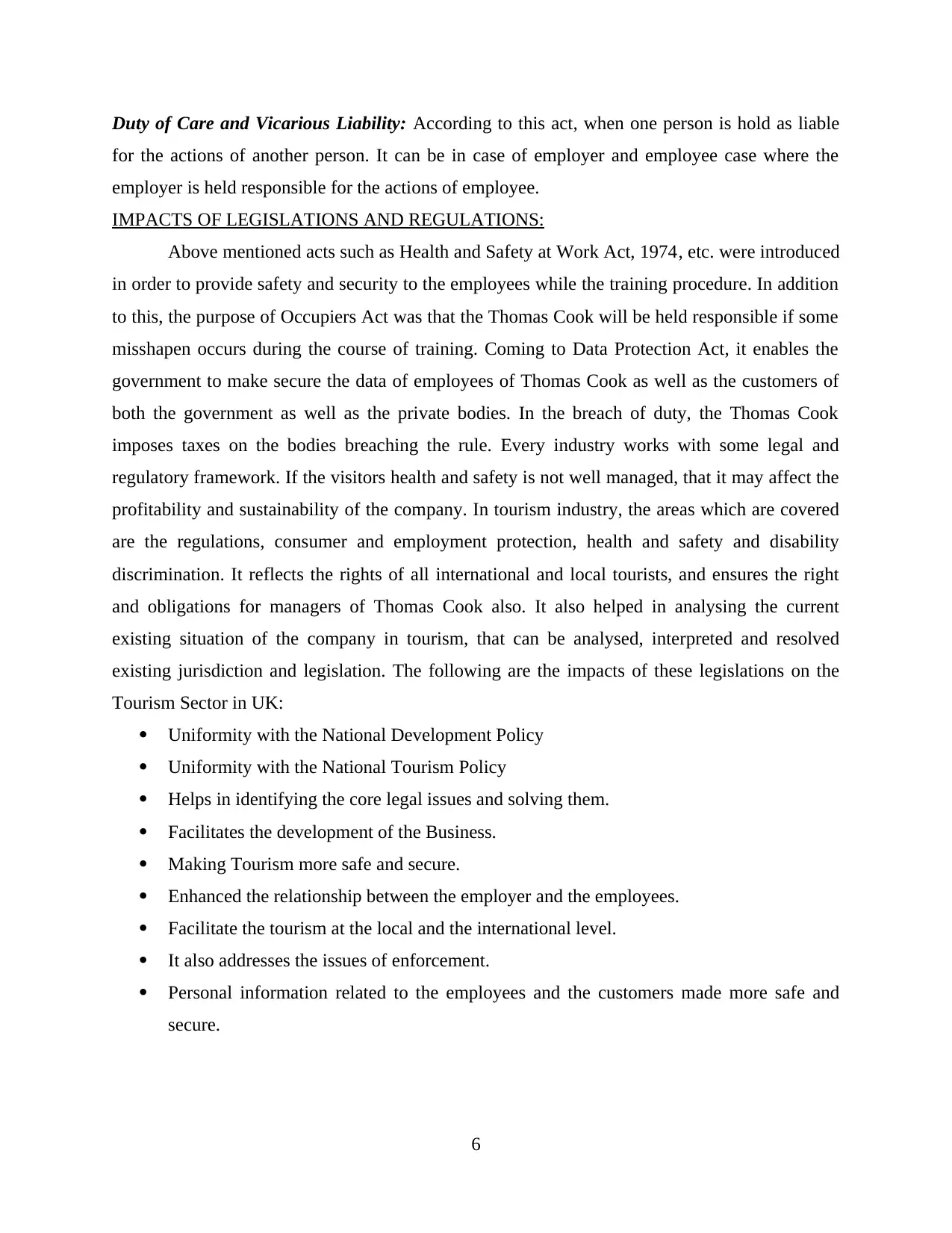
Duty of Care and Vicarious Liability: According to this act, when one person is hold as liable
for the actions of another person. It can be in case of employer and employee case where the
employer is held responsible for the actions of employee.
IMPACTS OF LEGISLATIONS AND REGULATIONS:
Above mentioned acts such as Health and Safety at Work Act, 1974, etc. were introduced
in order to provide safety and security to the employees while the training procedure. In addition
to this, the purpose of Occupiers Act was that the Thomas Cook will be held responsible if some
misshapen occurs during the course of training. Coming to Data Protection Act, it enables the
government to make secure the data of employees of Thomas Cook as well as the customers of
both the government as well as the private bodies. In the breach of duty, the Thomas Cook
imposes taxes on the bodies breaching the rule. Every industry works with some legal and
regulatory framework. If the visitors health and safety is not well managed, that it may affect the
profitability and sustainability of the company. In tourism industry, the areas which are covered
are the regulations, consumer and employment protection, health and safety and disability
discrimination. It reflects the rights of all international and local tourists, and ensures the right
and obligations for managers of Thomas Cook also. It also helped in analysing the current
existing situation of the company in tourism, that can be analysed, interpreted and resolved
existing jurisdiction and legislation. The following are the impacts of these legislations on the
Tourism Sector in UK:
Uniformity with the National Development Policy
Uniformity with the National Tourism Policy
Helps in identifying the core legal issues and solving them.
Facilitates the development of the Business.
Making Tourism more safe and secure.
Enhanced the relationship between the employer and the employees.
Facilitate the tourism at the local and the international level.
It also addresses the issues of enforcement.
Personal information related to the employees and the customers made more safe and
secure.
6
for the actions of another person. It can be in case of employer and employee case where the
employer is held responsible for the actions of employee.
IMPACTS OF LEGISLATIONS AND REGULATIONS:
Above mentioned acts such as Health and Safety at Work Act, 1974, etc. were introduced
in order to provide safety and security to the employees while the training procedure. In addition
to this, the purpose of Occupiers Act was that the Thomas Cook will be held responsible if some
misshapen occurs during the course of training. Coming to Data Protection Act, it enables the
government to make secure the data of employees of Thomas Cook as well as the customers of
both the government as well as the private bodies. In the breach of duty, the Thomas Cook
imposes taxes on the bodies breaching the rule. Every industry works with some legal and
regulatory framework. If the visitors health and safety is not well managed, that it may affect the
profitability and sustainability of the company. In tourism industry, the areas which are covered
are the regulations, consumer and employment protection, health and safety and disability
discrimination. It reflects the rights of all international and local tourists, and ensures the right
and obligations for managers of Thomas Cook also. It also helped in analysing the current
existing situation of the company in tourism, that can be analysed, interpreted and resolved
existing jurisdiction and legislation. The following are the impacts of these legislations on the
Tourism Sector in UK:
Uniformity with the National Development Policy
Uniformity with the National Tourism Policy
Helps in identifying the core legal issues and solving them.
Facilitates the development of the Business.
Making Tourism more safe and secure.
Enhanced the relationship between the employer and the employees.
Facilitate the tourism at the local and the international level.
It also addresses the issues of enforcement.
Personal information related to the employees and the customers made more safe and
secure.
6
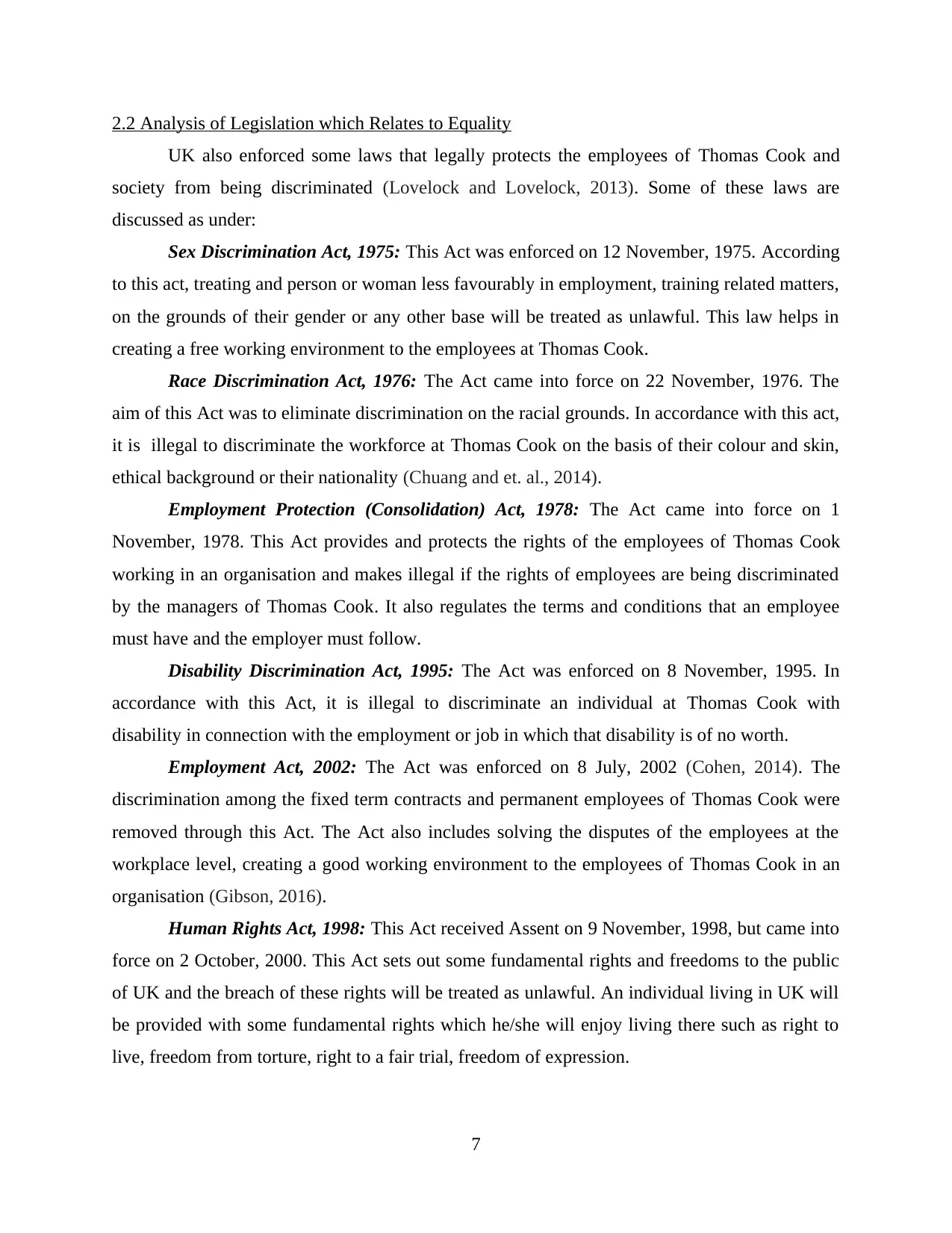
2.2 Analysis of Legislation which Relates to Equality
UK also enforced some laws that legally protects the employees of Thomas Cook and
society from being discriminated (Lovelock and Lovelock, 2013). Some of these laws are
discussed as under:
Sex Discrimination Act, 1975: This Act was enforced on 12 November, 1975. According
to this act, treating and person or woman less favourably in employment, training related matters,
on the grounds of their gender or any other base will be treated as unlawful. This law helps in
creating a free working environment to the employees at Thomas Cook.
Race Discrimination Act, 1976: The Act came into force on 22 November, 1976. The
aim of this Act was to eliminate discrimination on the racial grounds. In accordance with this act,
it is illegal to discriminate the workforce at Thomas Cook on the basis of their colour and skin,
ethical background or their nationality (Chuang and et. al., 2014).
Employment Protection (Consolidation) Act, 1978: The Act came into force on 1
November, 1978. This Act provides and protects the rights of the employees of Thomas Cook
working in an organisation and makes illegal if the rights of employees are being discriminated
by the managers of Thomas Cook. It also regulates the terms and conditions that an employee
must have and the employer must follow.
Disability Discrimination Act, 1995: The Act was enforced on 8 November, 1995. In
accordance with this Act, it is illegal to discriminate an individual at Thomas Cook with
disability in connection with the employment or job in which that disability is of no worth.
Employment Act, 2002: The Act was enforced on 8 July, 2002 (Cohen, 2014). The
discrimination among the fixed term contracts and permanent employees of Thomas Cook were
removed through this Act. The Act also includes solving the disputes of the employees at the
workplace level, creating a good working environment to the employees of Thomas Cook in an
organisation (Gibson, 2016).
Human Rights Act, 1998: This Act received Assent on 9 November, 1998, but came into
force on 2 October, 2000. This Act sets out some fundamental rights and freedoms to the public
of UK and the breach of these rights will be treated as unlawful. An individual living in UK will
be provided with some fundamental rights which he/she will enjoy living there such as right to
live, freedom from torture, right to a fair trial, freedom of expression.
7
UK also enforced some laws that legally protects the employees of Thomas Cook and
society from being discriminated (Lovelock and Lovelock, 2013). Some of these laws are
discussed as under:
Sex Discrimination Act, 1975: This Act was enforced on 12 November, 1975. According
to this act, treating and person or woman less favourably in employment, training related matters,
on the grounds of their gender or any other base will be treated as unlawful. This law helps in
creating a free working environment to the employees at Thomas Cook.
Race Discrimination Act, 1976: The Act came into force on 22 November, 1976. The
aim of this Act was to eliminate discrimination on the racial grounds. In accordance with this act,
it is illegal to discriminate the workforce at Thomas Cook on the basis of their colour and skin,
ethical background or their nationality (Chuang and et. al., 2014).
Employment Protection (Consolidation) Act, 1978: The Act came into force on 1
November, 1978. This Act provides and protects the rights of the employees of Thomas Cook
working in an organisation and makes illegal if the rights of employees are being discriminated
by the managers of Thomas Cook. It also regulates the terms and conditions that an employee
must have and the employer must follow.
Disability Discrimination Act, 1995: The Act was enforced on 8 November, 1995. In
accordance with this Act, it is illegal to discriminate an individual at Thomas Cook with
disability in connection with the employment or job in which that disability is of no worth.
Employment Act, 2002: The Act was enforced on 8 July, 2002 (Cohen, 2014). The
discrimination among the fixed term contracts and permanent employees of Thomas Cook were
removed through this Act. The Act also includes solving the disputes of the employees at the
workplace level, creating a good working environment to the employees of Thomas Cook in an
organisation (Gibson, 2016).
Human Rights Act, 1998: This Act received Assent on 9 November, 1998, but came into
force on 2 October, 2000. This Act sets out some fundamental rights and freedoms to the public
of UK and the breach of these rights will be treated as unlawful. An individual living in UK will
be provided with some fundamental rights which he/she will enjoy living there such as right to
live, freedom from torture, right to a fair trial, freedom of expression.
7
⊘ This is a preview!⊘
Do you want full access?
Subscribe today to unlock all pages.

Trusted by 1+ million students worldwide
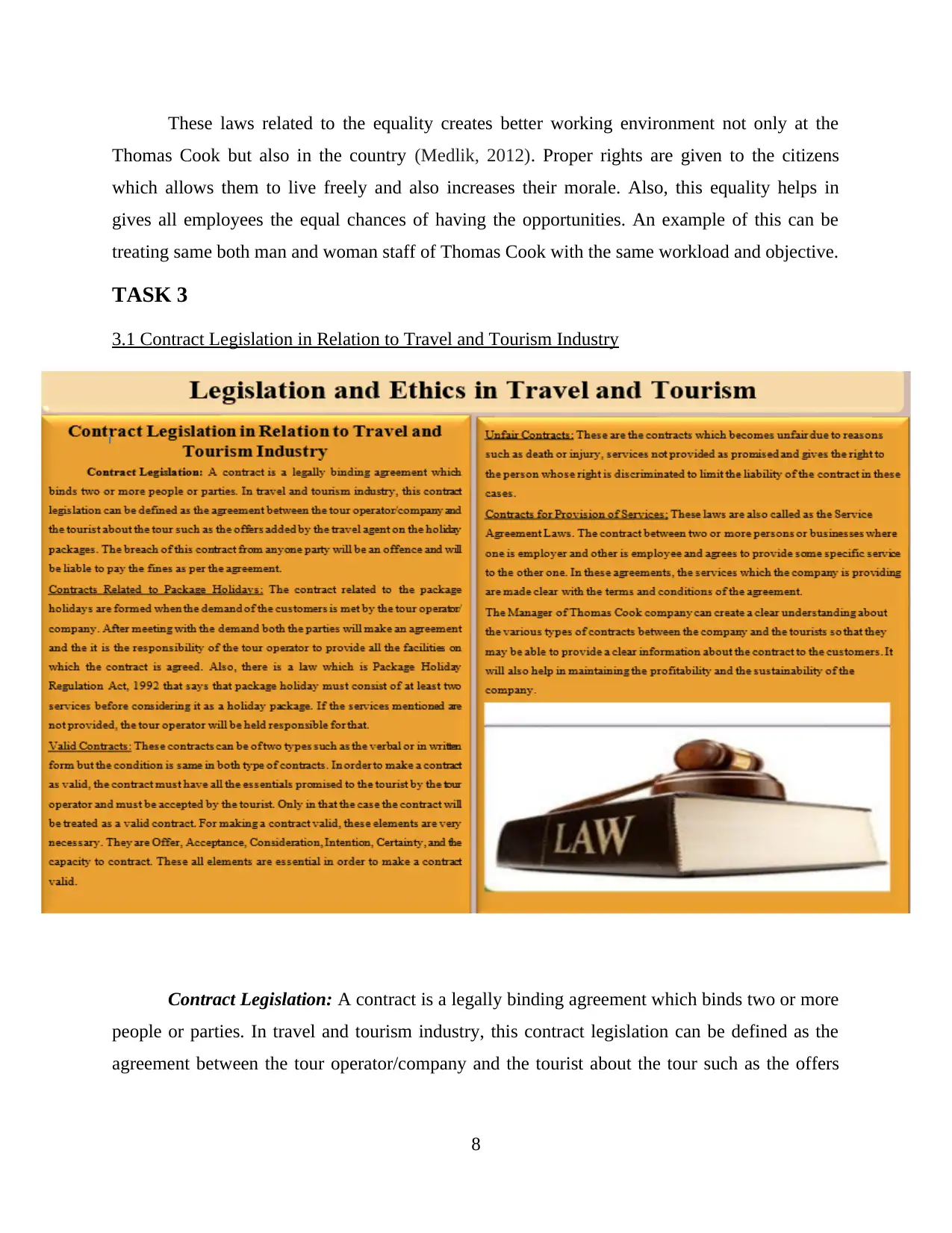
These laws related to the equality creates better working environment not only at the
Thomas Cook but also in the country (Medlik, 2012). Proper rights are given to the citizens
which allows them to live freely and also increases their morale. Also, this equality helps in
gives all employees the equal chances of having the opportunities. An example of this can be
treating same both man and woman staff of Thomas Cook with the same workload and objective.
TASK 3
3.1 Contract Legislation in Relation to Travel and Tourism Industry
Contract Legislation: A contract is a legally binding agreement which binds two or more
people or parties. In travel and tourism industry, this contract legislation can be defined as the
agreement between the tour operator/company and the tourist about the tour such as the offers
8
Thomas Cook but also in the country (Medlik, 2012). Proper rights are given to the citizens
which allows them to live freely and also increases their morale. Also, this equality helps in
gives all employees the equal chances of having the opportunities. An example of this can be
treating same both man and woman staff of Thomas Cook with the same workload and objective.
TASK 3
3.1 Contract Legislation in Relation to Travel and Tourism Industry
Contract Legislation: A contract is a legally binding agreement which binds two or more
people or parties. In travel and tourism industry, this contract legislation can be defined as the
agreement between the tour operator/company and the tourist about the tour such as the offers
8
Paraphrase This Document
Need a fresh take? Get an instant paraphrase of this document with our AI Paraphraser
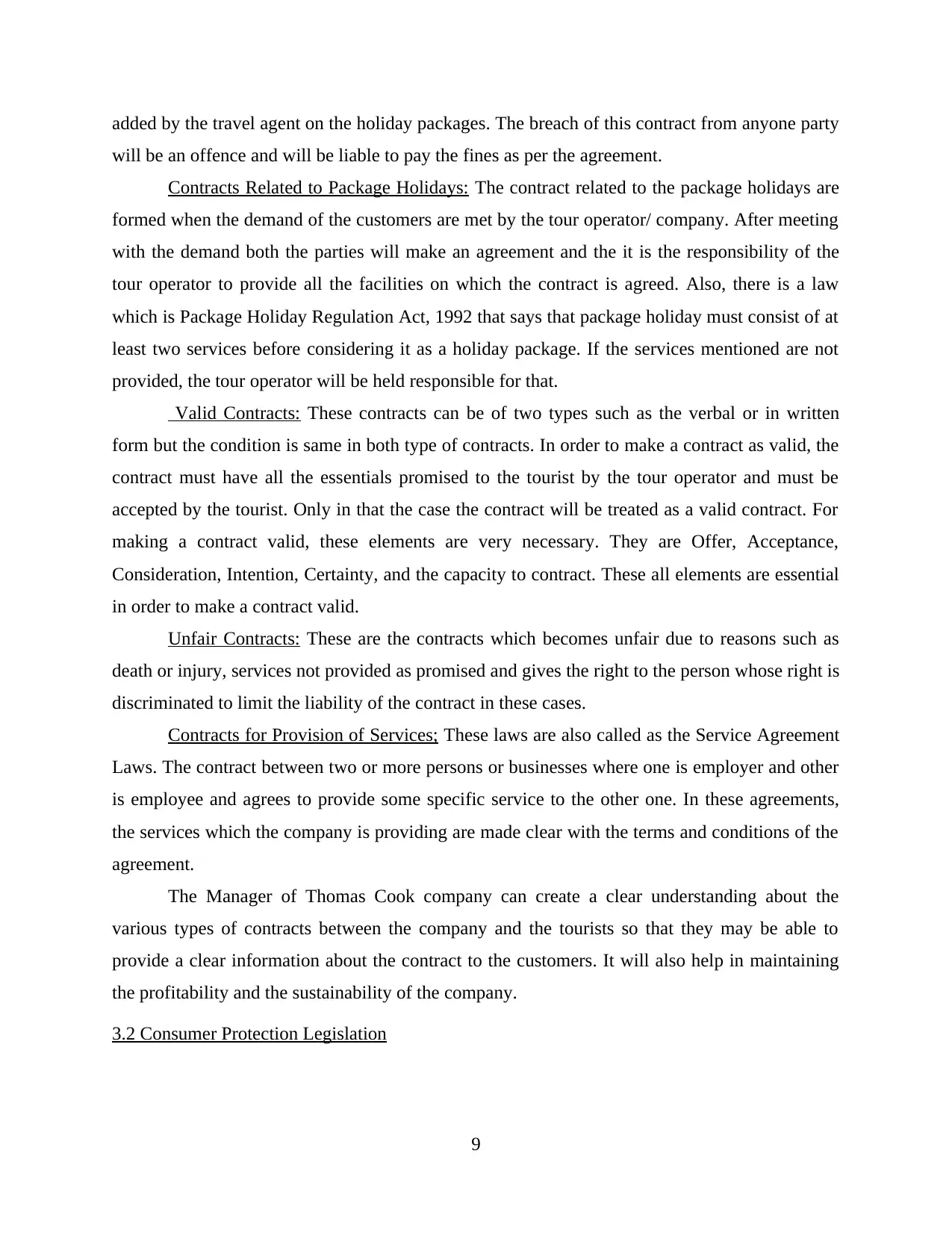
added by the travel agent on the holiday packages. The breach of this contract from anyone party
will be an offence and will be liable to pay the fines as per the agreement.
Contracts Related to Package Holidays: The contract related to the package holidays are
formed when the demand of the customers are met by the tour operator/ company. After meeting
with the demand both the parties will make an agreement and the it is the responsibility of the
tour operator to provide all the facilities on which the contract is agreed. Also, there is a law
which is Package Holiday Regulation Act, 1992 that says that package holiday must consist of at
least two services before considering it as a holiday package. If the services mentioned are not
provided, the tour operator will be held responsible for that.
Valid Contracts: These contracts can be of two types such as the verbal or in written
form but the condition is same in both type of contracts. In order to make a contract as valid, the
contract must have all the essentials promised to the tourist by the tour operator and must be
accepted by the tourist. Only in that the case the contract will be treated as a valid contract. For
making a contract valid, these elements are very necessary. They are Offer, Acceptance,
Consideration, Intention, Certainty, and the capacity to contract. These all elements are essential
in order to make a contract valid.
Unfair Contracts: These are the contracts which becomes unfair due to reasons such as
death or injury, services not provided as promised and gives the right to the person whose right is
discriminated to limit the liability of the contract in these cases.
Contracts for Provision of Services; These laws are also called as the Service Agreement
Laws. The contract between two or more persons or businesses where one is employer and other
is employee and agrees to provide some specific service to the other one. In these agreements,
the services which the company is providing are made clear with the terms and conditions of the
agreement.
The Manager of Thomas Cook company can create a clear understanding about the
various types of contracts between the company and the tourists so that they may be able to
provide a clear information about the contract to the customers. It will also help in maintaining
the profitability and the sustainability of the company.
3.2 Consumer Protection Legislation
9
will be an offence and will be liable to pay the fines as per the agreement.
Contracts Related to Package Holidays: The contract related to the package holidays are
formed when the demand of the customers are met by the tour operator/ company. After meeting
with the demand both the parties will make an agreement and the it is the responsibility of the
tour operator to provide all the facilities on which the contract is agreed. Also, there is a law
which is Package Holiday Regulation Act, 1992 that says that package holiday must consist of at
least two services before considering it as a holiday package. If the services mentioned are not
provided, the tour operator will be held responsible for that.
Valid Contracts: These contracts can be of two types such as the verbal or in written
form but the condition is same in both type of contracts. In order to make a contract as valid, the
contract must have all the essentials promised to the tourist by the tour operator and must be
accepted by the tourist. Only in that the case the contract will be treated as a valid contract. For
making a contract valid, these elements are very necessary. They are Offer, Acceptance,
Consideration, Intention, Certainty, and the capacity to contract. These all elements are essential
in order to make a contract valid.
Unfair Contracts: These are the contracts which becomes unfair due to reasons such as
death or injury, services not provided as promised and gives the right to the person whose right is
discriminated to limit the liability of the contract in these cases.
Contracts for Provision of Services; These laws are also called as the Service Agreement
Laws. The contract between two or more persons or businesses where one is employer and other
is employee and agrees to provide some specific service to the other one. In these agreements,
the services which the company is providing are made clear with the terms and conditions of the
agreement.
The Manager of Thomas Cook company can create a clear understanding about the
various types of contracts between the company and the tourists so that they may be able to
provide a clear information about the contract to the customers. It will also help in maintaining
the profitability and the sustainability of the company.
3.2 Consumer Protection Legislation
9
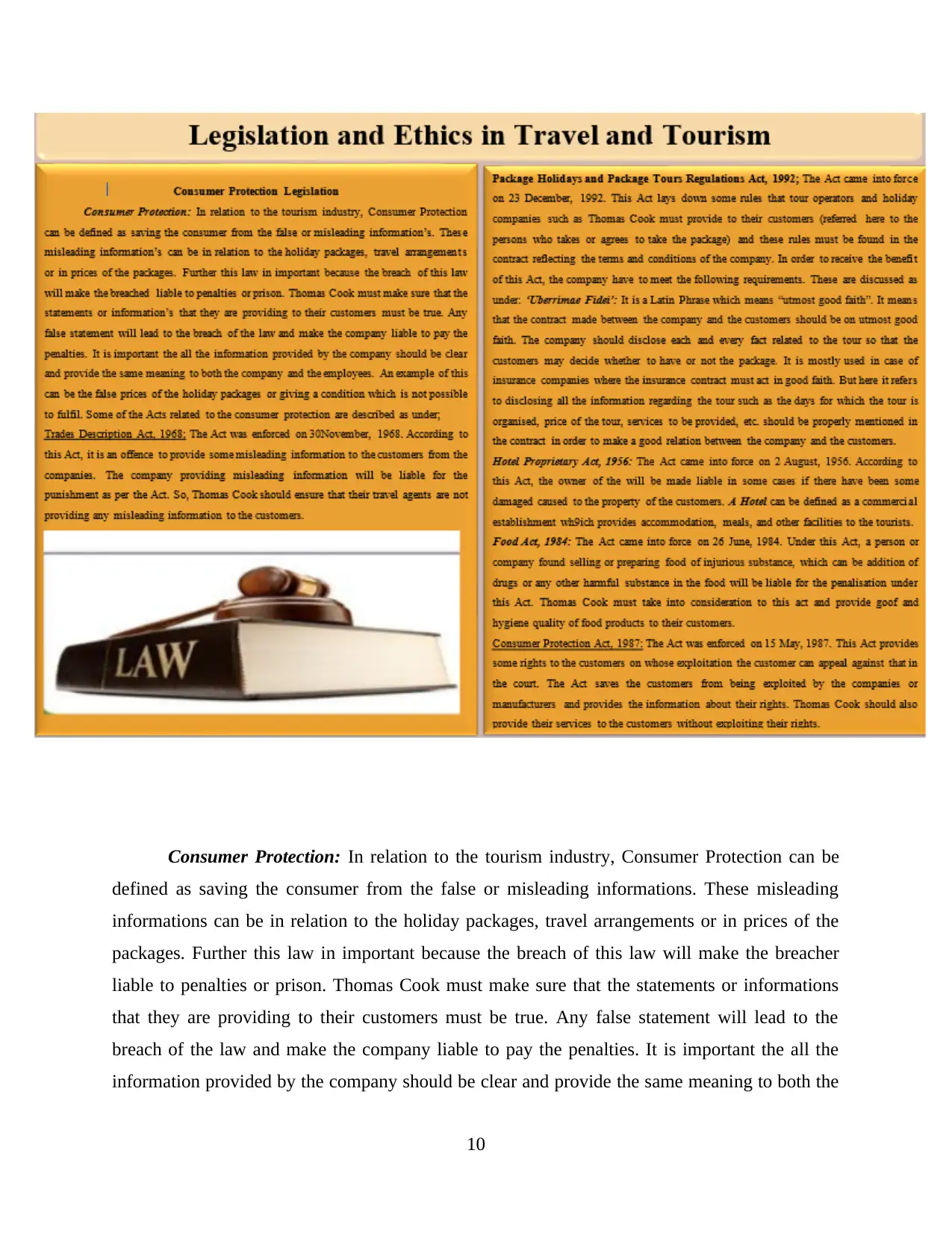
Consumer Protection: In relation to the tourism industry, Consumer Protection can be
defined as saving the consumer from the false or misleading informations. These misleading
informations can be in relation to the holiday packages, travel arrangements or in prices of the
packages. Further this law in important because the breach of this law will make the breacher
liable to penalties or prison. Thomas Cook must make sure that the statements or informations
that they are providing to their customers must be true. Any false statement will lead to the
breach of the law and make the company liable to pay the penalties. It is important the all the
information provided by the company should be clear and provide the same meaning to both the
10
defined as saving the consumer from the false or misleading informations. These misleading
informations can be in relation to the holiday packages, travel arrangements or in prices of the
packages. Further this law in important because the breach of this law will make the breacher
liable to penalties or prison. Thomas Cook must make sure that the statements or informations
that they are providing to their customers must be true. Any false statement will lead to the
breach of the law and make the company liable to pay the penalties. It is important the all the
information provided by the company should be clear and provide the same meaning to both the
10
⊘ This is a preview!⊘
Do you want full access?
Subscribe today to unlock all pages.

Trusted by 1+ million students worldwide
1 out of 20
Related Documents
Your All-in-One AI-Powered Toolkit for Academic Success.
+13062052269
info@desklib.com
Available 24*7 on WhatsApp / Email
![[object Object]](/_next/static/media/star-bottom.7253800d.svg)
Unlock your academic potential
Copyright © 2020–2026 A2Z Services. All Rights Reserved. Developed and managed by ZUCOL.



